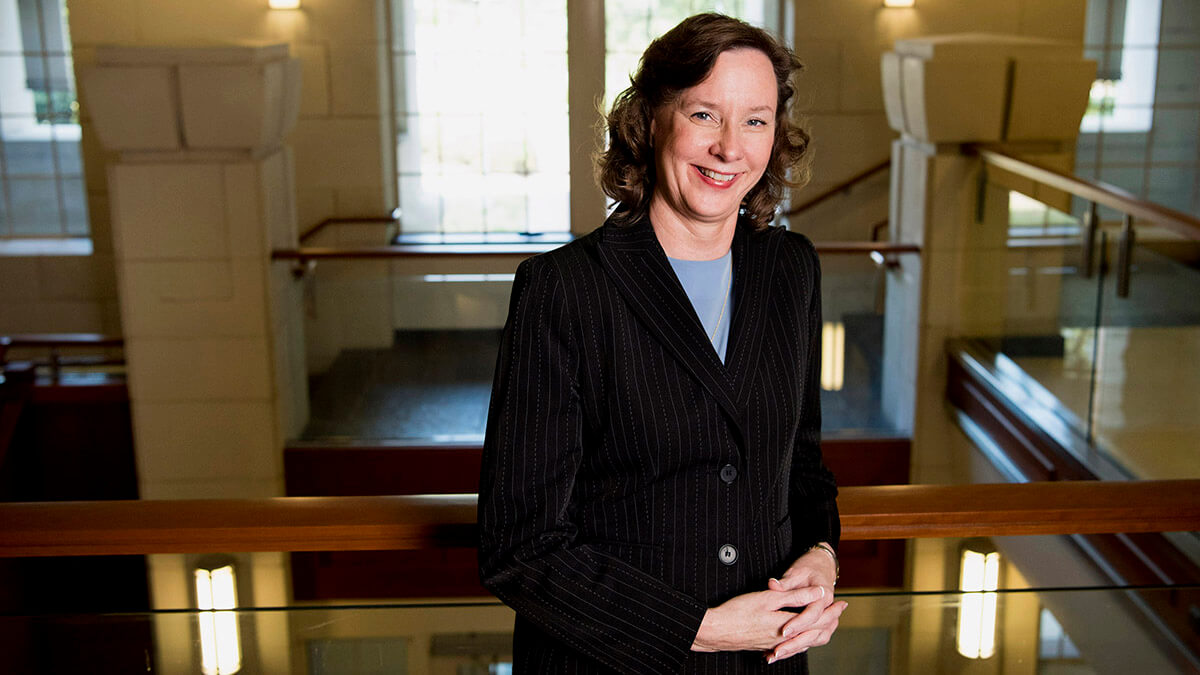Listening, questioning, responding
Joy Renner, recipient of a 2016 C. Knox Massey Distinguished Services Award, is a tireless winner in most everything she does.

At first, Joy Renner’s father couldn’t understand why his daughter wanted to enter the America’s Junior Miss pageant at her high school in Hendersonville.
“You know you are not really pretty, right?” he said.
“Of course,” she said, without flinching. But she did not want to compete to prove she was pretty, she explained. “They give scholarships for academics and talent and other categories.”
“Well, that makes sense,” he said. He knew the odds were in her favor academically. She had the grades to prove it. And he, a barber, and her mother, a stay-at-home mom, had raised Renner and her two older brothers with the expectation they would go to college. (One went to Carolina, the other to N.C. State)
So he gave her permission to compete in the pageant.
“People can’t believe that this is a good story that was one of many lessons learned from my parents,” Renner said. “My father wasn’t trying to be cruel. He was being kind and helping me see my world realistically and recognizing I might not be perfect and have everything, but I should be proud and appreciative of what I can do and do have.”
Wearing a prom dress and playing the piano in the talent competition, Renner was runner-up in the overall pageant, won the academic category and was voted “most congenial” in the pageant. But the real prize for Renner was the academic scholarship she received and took with her to Carolina when she enrolled fall 1976.
Diplomat and mediator
Renner’s most recent award – a 2016 C. Knox Massey Distinguished Services Award – also reveals how some of some of her father’s insistence on getting to the bottom of things – by listening, questioning and responding – and her mother’s sense of humor and poise in many different settings, were invaluable qualities passed down to her.
In her nominating letter, law professor Lissa Broome rattled off all the contributions Renner has made to the University on top of her “day job” as clinical associate professor and director of the Division of Radiologic Science.
She has served as an award-winning faculty adviser; a member of the Faculty Council’s Faculty Athletics Committee (FAC) since 2009, the past four years as its chair; a member of the Chancellor’s Advisory Committee; and most recently, as a member of the Ethics and Integrity Working Group that Chancellor Carol L. Folt formed two years ago in response to the findings of the independent investigation by former federal prosecutor Kenneth Wainstein into past academic irregularities at Carolina.
In all of these duties, Broome wrote, “Joy is tireless and determined to leave things better than she found them.”
One way she has done that is by spending countless hours listening to people, including those who disagree with her, or think they do. After conversations, many found they shared much common ground and many common goals with her.
“She has engaged in open and honest dialogue with faculty and encouraged them to voice their concerns and become more informed,” Broome wrote. “She has increased communication between various parts of campus, defused difficult situations and helped people find common ground to improve the University.”
Broome added that it was hard to imagine anyone these past few years who had given more time “so selflessly” to help guide Carolina through one of the most difficult periods in its history.
For the past six years, the award citation stated, Renner occupied the “narrow space between emerging facts and escalating feelings,” serving as both diplomat and mediator by “invoking the power of listening to find discernment through discourse.”
Read more about in the University Gazette.
This story is one of a series featuring 2016 winners of the C. Knox Massey Distinguished Service Award. The late C. Knox Massey of Durham created the awards in 1980 to recognize “unusual, meritorious or superior contributions” by University employees. The award is supported by the Massey-Weatherspoon Fund created by three generations of Massey and Weatherspoon families.




